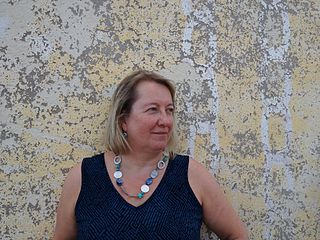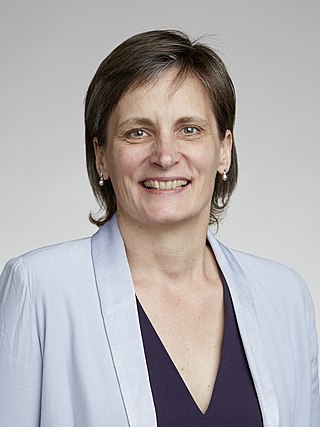Related Research Articles
The Earth Institute is a research institute at Columbia University created in 1995 for addressing complex issues facing the planet and its inhabitants, with a focus on sustainable development. With an interdisciplinary approach, this includes research in climate change, geology, global health, economics, management, agriculture, ecosystems, urbanization, energy, hazards, and water. The Earth Institute's activities are guided by the idea that science and technological tools that already exist could be applied to greatly improve conditions for the world's poor, while preserving the natural systems that support life on Earth.
Wim C. Turkenburg is emeritus professor 'Science, Technology & Society' (STS) at Utrecht University, the Netherlands, and owner of a consultancy on energy and environmental issues. He is member of the board of the Foundation Preparation Pallas reactor as well as member of some advisory and programming committees on issues ranging from nuclear waste management and the safety of nuclear power plants and natural gas exploitation to RD&D programming in the field of bioenergy and biomaterials. In addition he communicates regularly on energy issues in public media.

Copernicus is the Earth observation component of the European Union Space Programme, managed by the European Commission and implemented in partnership with the EU member states, the European Space Agency (ESA), the European Organisation for the Exploitation of Meteorological Satellites (EUMETSAT), the European Centre for Medium-Range Weather Forecasts (ECMWF), the Joint Research Centre (JRC), the European Environment Agency (EEA), the European Maritime Safety Agency (EMSA), Frontex, SatCen and Mercator Océan.

Felix Dodds, born Michael Nicholas Dodds, is a British author, futurist, and activist.
Ecogovernmentality, is the application of Foucault's concepts of biopower and governmentality to the analysis of the regulation of social interactions with the natural world. The concept of Ecogovernmentality expands on Foucault's genealogical examination of the state to include ecological rationalities and technologies of government. Begun in the mid-1990s by a small body of theorists the literature on ecogovernmentality grew as a response to the perceived lack of Foucauldian analysis of environmentalism and in environmental studies.
Sustainability science first emerged in the 1980s and has become a new academic discipline. Similar to agricultural science or health science, it is an applied science defined by the practical problems it addresses. Sustainability science focuses on issues relating to sustainability and sustainable development as core parts of its subject matter. It is "defined by the problems it addresses rather than by the disciplines it employs" and "serves the need for advancing both knowledge and action by creating a dynamic bridge between the two".

The Earth System Governance Project is a research network that builds on the work from about a dozen research centers and hundreds of researchers studying earth system governance. It is a long-term, interdisciplinary social science research alliance. Its origins are an international program called the International Human Dimensions Programme on Global Environmental Change. The ESG Project started in January 2009. Over time, it has evolved into a broader research alliance that builds on an international network of research centers, lead faculty and research fellows. It is now the largest social science research network in the area of governance and global environmental change.
Environmental governance (EG) consists of a system of laws, norms, rules, policies and practices that dictate how the board members of an environment related regulatory body should manage and oversee the affairs of any environment related regulatory body which is responsible for ensuring sustainability (sustainable development) and manage all human activities—political, social and economic. Environmental governance includes government, business and civil society, and emphasizes whole system management. To capture this diverse range of elements, environmental governance often employs alternative systems of governance, for example watershed-based management. Obviously, in fact the EG arrangements are very diversed and not at all as inclusive as we could wish them to be.

The United Nations Environment Programme Finance Initiative is a partnership between the United Nations Environment Program (UNEP) and the global financial sector to catalyse action across the financial system to align economies with sustainable development. As the UN partner for the finance sector, they convene financial institutions on a voluntary basis to work together with them, and each other, to find practical solutions to overcome the many sustainability challenges facing the world today. UNEP FI does this by providing practical guidance and tools which support institutions in the finance sector to find ways to reshape their businesses and commit to targets for limiting greenhouse gas emissions, protecting nature, promoting a circular economy and supporting financial inclusion to address inequality. The solutions developed effectively form a blueprint for others in the finance sector to tackle similar challenges and evolve their businesses along a sustainable pathway. The creation and adoption of such a blueprint also informs policy makers concerned with sustainability issues about what would constitute appropriate regulation for the finance sector at large. Founded in 1992, UNEP FI was the first organisation to pioneer engagement with the finance sector around sustainability. The Finance Initiative was responsible for incubating the Principles for Responsible Investment and for the development and implementation of UNEP FI's Principles for Responsible Banking and Principles for Sustainable Insurance as well as the UN-convened net-zero alliances. Today, UNEP FI provides sustainability leadership to more than 400 financial institutions, with assets of well over $80 trillion headquartered around the world.

Earth system governance is a broad area of scholarly inquiry that builds on earlier notions of environmental policy and nature conservation, but puts these into the broader context of human-induced transformations of the entire earth system. The integrative paradigm of earth system governance (ESG) has evolved into an active research area that brings together a variety of disciplines including political science, sociology, economics, ecology, policy studies, geography, sustainability science, and law.

Diana Liverman is a retired Regents Professor of Geography and Development and past Director of the University of Arizona School of Geography, Development and Environment in the College of Social and Behavioral Sciences in Tucson, Arizona.
James O. Adegoke is a Nigerian-American climate scientist and Emeritus Professor at the University of Missouri-Kansas City (UMKC) where he served as Chair of the Department of Geosciences (2008-2010). He also served as an appointee of the Mayor of Kansas City Missouri on the city's Environmental Management Commission (EMC) and has testified before the South Africa Parliament's Portfolio Committee on Science and Technology and the Climate Change Committee of the Nigerian House of Representatives. In the United States, he has testified at the United States House of Representatives for the United States House Select Committee on Energy Independence and Global Warming.

Marie Corinne Lyne Le Quéré is a Canadian scientist. She is Royal Society Research Professor of Climate Change Science at the University of East Anglia and former Director of Tyndall Centre for Climate Change Research. She is the chair of the French High Council on Climate and member of the UK Climate Change Committee. Her research focuses on the interactions between the carbon cycle and climate change.

The contributions of women in climate change have received increasing attention in the early 21st century. Feedback from women and the issues faced by women have been described as "imperative" by the United Nations and "critical" by the Population Reference Bureau. A report by the World Health Organization concluded that incorporating gender-based analysis would "provide more effective climate change mitigation and adaptation."

The Research Institute for Sustainability (RIFS) in Potsdam conducts research with the aim of investigating, identifying, and advancing development pathways for transformation processes towards sustainability in Germany and abroad. The Institute joined the Helmholtz Association in 2023 and is affiliated with the Helmholtz Centre Potsdam – GFZ German Research Centre for Geosciences. Its research approach is transdisciplinary, transformative, and co-creative. The Institute cooperates with partners in science, political and administrative institutions, the business community, and civil society to develop solutions for sustainability challenges that enjoy broad public support. Its central research topics include the energy transition, climate change and socio-technical transformations, as well as sustainable governance and participation, and cultures of transformation in the Anthropocene. A strong network of national and international partners and a Fellow Programme supports the work of the Institute.

Kyle Powys Whyte is an Indigenous philosopher and climate/environmental justice scholar. He is a Professor of Environment and Sustainability and George Willis Pack Professor at the University of Michigan's School for Environment and Sustainability. Whyte formally served as the Timnick Chair in the Humanities in the Department of Philosophy at Michigan State University's College of Arts & Letters.

Xiaogang Ma or Marshall Ma is a data science and geoinformatics researcher at the University of Idaho (UI), United States. He is an associate professor in the department of computer science at UI, and also affiliates with the department of earth and spatial sciences and several research institutes and centers at the university.

Joyeeta Gupta is a Dutch environmental scientist who is professor of Environment and Development in the Global South at the University of Amsterdam, professor of Law and Policy in Water Resources and Environment at IHE Delft Institute for Water Education, and co-chair of the Earth Commission, set up by Future Earth and supported by the Global Challenges Foundation. She was co-chair of UNEP's Global Environment Outlook-6 (2016–2019), published by Cambridge University Press, which was presented to governments participating in the United Nations Environment Assembly in 2019. She is a member of the Amsterdam Global Change Institute. She was awarded the Association of American Publishers PROSE award for Environmental Science and the 2023 Spinoza Prize.
Frank Biermann is a German political scientist and professor at Utrecht University in the Netherlands. His research interests are in "global institutions and organisations in the sustainability domain". He was the founder in 2006 and first chair of the Earth System Governance Project. From 2018 until 2024 he directed a 2.5-million EUR research programme on the steering effects of the Sustainable Development Goals. This was funded through a European Research Council Advanced Grant.
References
- 1 2 Falaiye, Henry (8 November 2023). "Okereke elected fellow of World Academy of Sciences". The Punch . Retrieved 3 November 2023.
- ↑ "Prof. Chukwumerije O." Center for Climate Change and Development. Retrieved 3 December 2023.
- ↑ "Chukwumerije Okereke". Institut Montaigne . Retrieved 3 December 2023.
- ↑ Earth System Governance Project (2020) Annual Report 2020, Earth System Governance International Project Office at Copernicus Institute of Sustainable Development at Faculty of Geosciences, Utrecht University
- 1 2 Earth System Governance Project (2023) Annual Report 2023, Earth System Governance International Project Office at Copernicus Institute of Sustainable Development at Faculty of Geosciences, Utrecht University
- ↑ "Scientific Steering Committee (SSC)". Earth System Governance Project. Retrieved 2024-10-08.